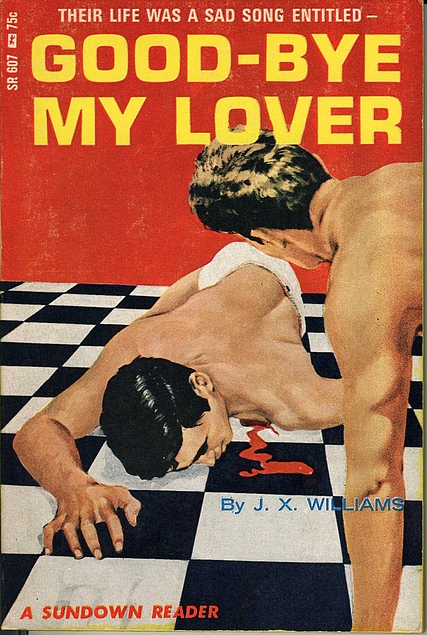
Historically significant gay murder mystery! Today Goodbye, My Lover merely reads like the campy whodunit that it is, but when it was originally published in 1966 it must’ve been a life-changing experience for gay readers seeking evidence that they deserve a place in the world.
The characters are happily gay and living their best life—even as they navigate an intricate murder plot. Rather than resent their sexuality or commit suicide by the end, they are more reaffirmed than ever to have long-term gay relationships in their future. Homophobia is largely absent and certainly not dwelled upon. Possibly because the novel takes place in Los Angeles, which was fantastically more liberated than the rest of the country, but generally queer pulp fiction was eager to explore a post-homophobic fantasy world where gay men were free from oppression.
The pulp fantasy is typically created through the total absence of heterosexual characters. Cops, colleagues, bosses, parents, even siblings and religious figures—any potential antagonist to the gay man—are neutralized by also being gay. In Goodbye, My Lover we see something similar. There’s the real-life consequences of being gay in the ’60s, in that military careers could be ruined and social scandal could arise by coming out, but these issues are the vague rationales of a murder ploy. The villains are also gay, further eliminating the problem of “society” from the equation. Social anxieties exist, of course, but for 150 pages they don’t matter. At least not much.
We can appreciate the significance of queer pulp thanks to hindsight, but I highly doubt these writers designed their novels for social impact. All evidence suggests they were merely tired of how LGBT persons were depicted in art and chose to write their own stories. If the heteros got upset, too bad. This wasn’t for them. It seems like a low bar now, but these books provided much-needed justification for gay existence by showing a normal—if highly romanticized—world where they could be themselves. It’s almost impossible to imagine the Stonewall riots happening when it did without the underground popularity of paperbacks such as this one.
History aside, the book is a blast. It’s set up for erotic delights with Dennis sleuthing out leather bars to find out who might have killed his prior lover. Willing to go the extra mile for justice, he beds the more attractive suspects to get the information he needs. A small cast of characters allows for easy reading, a relatively small list of potential murderers, and the twists are good enough to surprise. If you want a slice of LGBT history with your mystery adventures, and don’t mind a few tasteful bedroom scenes, this is where it’s at. Highly recommended!
**UPDATE** I learned that there is a difference between the original publication and Victor J. Banis’ 2007 reprint. The original includes two sex scenes that were written by the publisher and added without his consent. He removed them for the new edition to restore the novel to his original vision.
Availability…
Gay pulp fiction from the 1960’s and ‘70s is almost all out-of-print and nearly impossible to find today. Fortunately, this book has been re-printed under Victor Banis’ name. Now you can even find it on your e-reader or as an audiobook. The first edition published under one of Banis’ many pseudonyms, J.X. Williams, is scarce and potentially worth a pretty penny.
Follow our bookish social media…
